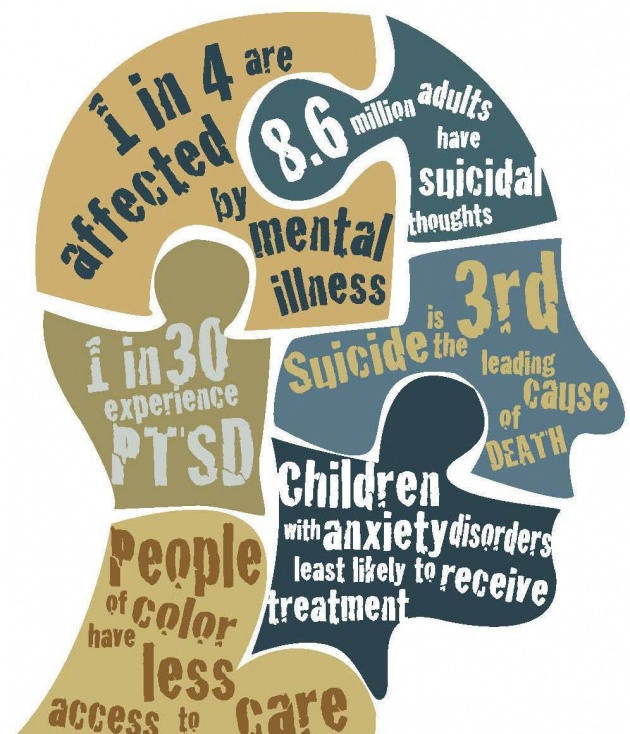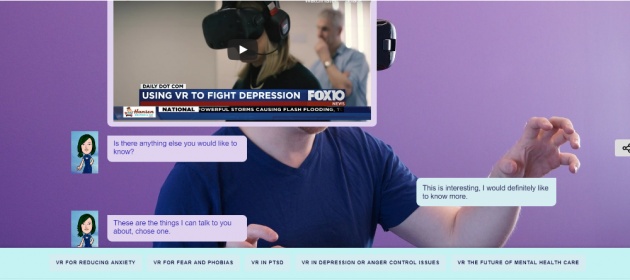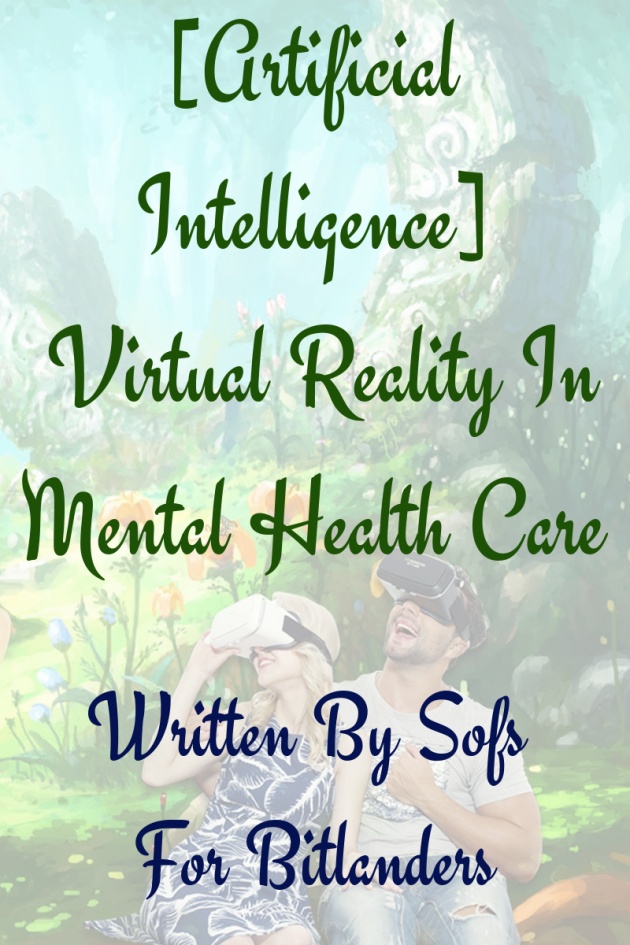Current Scenario In Mental Health Care And The Role Of VR
We live in a fast-paced world where everything needs to be done yesterday. Stress is woven into the fabric of our everyday lifestyle. Anxiety and depression follow when stress levels go up they interfere with our day to day functioning.
The WHO (World Health Organization) states that depression will be the biggest disease by the year 2030. Does AI have an answer to this problem? Virtual reality could be the answer to today's mental health problems. It may not replace the therapist but Virtual reality tools are effective enough to help people with anxiety, depression, PSTD or phobias.
Currently there is a huge imbalance in the clinician patient ratio when it comes to mental health care. There aren’t enough clinicians to help the number of people with these problems nor do the major number of people who faces these issues have the resources to pay for these treatments.
Health systems have not yet adequately responded to the burden of mental disorders. As a consequence, the gap between the need for treatment and its provision is wide all over the world. In low- and middle-income countries, between 76% and 85% of people with mental disorders receive no treatment for their disorder. In high-income countries, between 35% and 50% of people with mental disorders are in the same situation. WHO
Anxiety, phobias or mood disorders could seriously affect the day to day functioning of people. It disturbs perception and causes them to avoid/fear certain situations because they perceive it to be threatening. This in turn affects their earning capacity leading to stress and the vicious cycle continues.
The most effective way to help out people with these conditions is through counselling / therapy, CBT or Cognitive Behavioral therapy or exposure therapy. However, since there are not many trained therapists available and also because people cannot afford these treatments, the current system resorts to putting these individuals on medication.
Several patients become dependent on these drugs that they may not even consider other forms of treatment. Facing their fears on their own becomes a herculean task for them. This interferes with their normal functioning.
It is impossible to live to one’s fullest potential under these conditions. Technology seems to be just what the doctor ordered to see them through these difficulties.
Depression and anxiety disorders, the two most common mental illnesses, each affect 19 million American adults each year - National Institute of Mental Health, 2000
Virtual Reality (VR) An Effective Tool In Mental Health Care
The visuospatial aspects of VR lends itself to create powerful simulations of scenarios similar to what the client faces causing him/her anxiety or mood related conditions. This makes VR a powerful tool in treatment. At the click of the button the client can be introduced into the scenario without the therapist or clinician having to recreate it.
With this technology the clinician does not have to make a trip with the client to the real world scenario. The clinician is able to introduce the client to the environment, measure their physiological changes and work out a line of treatment without any risks involved. This reduces the burden of the clinician to a large extent.
VR games have also been used effectively to deal with fears and phobias. Gaming engages the client,increases the level of participation especially if there are rewards or levels involved in the games. The level of confidence it helps build in the client is amazing.

Image credit Namicolorado via Google
Advantages Of Virtual Reality In Mental Health Care
VRET (Virtual Reality Exposure Treatment) is a graded, progressive and individualized form of treatment. It has been found to be very effective according to some studies. Virtual reality Therapy works much faster than traditional methods.
The advantage is that the individual can go through the process as many times as needed to get to a place of calmness, confidence and ability to face their greatest fears.
This AI based Virtual reality Mental health tool is time saving and far reaching. This makes it the most appealing mental health care tool at this point in time.
The fact that a client will not even consent to walking into a real-world situation is now eliminated in an altered or virtual world simulation. Cooperation and engagement in therapy could be much higher with VR
Most of all VR therapy is exactly what we need for our day and age. It holds within it all that clinicians have been working toward techniques such as visualization, exposure or even CBT. VR seems to be the light at the end of the tunnel for those individuals who struggle with their moods and fears.
In the interactive chat blog below we will explore how in certain conditions like anxiety, phobia, depression, PTSD Virtual reality tools can help. We will also explore the future of VR in Mental health care

Screen shot of the Querlo Chat on Virtual Reality In Mental Health Care Via Bitlanders
Kindly join me in the following discussion.
Querlo Chat on [Artificial Intelligence] Virtual Reality In Mental Health Care
Final Thoughts
VR may not be the ultimate tool that replaces the therapist, it is however the most effective tool at the moment. If we could find a way to bring down the costs of the headsets more people can benefit from this technology.
With the current volume of need for mental health care in the society VR will not only help millions of people all around the world to live their lives without fear and anxiety but will also be able to release them into freedom of thought and expression like never before.
VR is not only a boon to people with mental health issues but also to clinicians who will now be able to focus more on research or on other clients who need their help.
VR is still in its infancy and promises to do much than we can even imagine in the future. VR can no more be confined to gaming and entertainment. Its wide spread use in mental health care and various fields like training, education etc., could make VR the most viable technology around.
I can only see VR as an emerging technology with a wide range of application, much wider than those what we use it today.
*********************************************************************************
This blog post is written in support of the announcement made by Micky about the Bitlanders AI-Themed Blogging.This blog also incorporates the C Blog (Double bonus reward topics). This article is the second in the line of Virtual Reality in this series on Artificial Intelligence.
After the successful launch of "The bitLanders C-blogging", conversational AI blogging by Querlo powered by IBM Watson and Microsoft Azure. bitLanders continues to support its joint venture Querlo. We believe in our mission to promote our future - Artificial Intelligence (AI) - and build AI conversations via blogging, here we are to introduce "bitLanders AI-themed blogging!". -Credit: quote from bitLanders
My other blogs that might be of interest to you
ARTIFICIAL INTELLIGENCE - VIRTUAL REALITY THE TECHNOLOGY OF THE FUTURE
ARTIFICIAL INTELLIGENCE IN HEALTHCARE - C- BLOGGING
AI ENHANCED WEARABLES _WEARABLE TECHNOLOGY DEVICES
CURRENT TRENDS IN AI - WHAT THE FUTURE HOLDS FOR US
EMOTIONAL ATTACHMENT TO AI ASSISTANTS AND COMPANIONS
ARTIFICIAL INTELLIGENCE IN SPECIAL EDUCATION
WHY ARTIFICIAL INTELLIGENCE NEEDS A FEMALE PERSONA
THE AI THERAPIST - AI IN MENTAL HEALTH
All images used in this blog have been duly credited, no copyright Infringement Intended.
Thank you for reading and interacting with me on this blog. I hope that information I have shared on this blog has been helpful to you.
**** ♥♥♥♥♥ Sofs ♥♥♥♥♥****
Would you like to share your thoughts and earn through Bitlanders? Follow this link and claim your first $1 reward on sign up.




